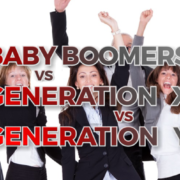Generational Diversity at the Workplace
In the last couple of years, the workforce has begun changing dramatically due to the entrance of more and more millennials. Numerous companies are struggling to understand their needs and requirements. This struggle comes from a lack of communication and comments range from:
- “Millennials don’t care about work or the company. We would train them and after a week they quit for a job with better pay.”
- “The meaning of work doesn’t exist to them – they are always after rewards even though they do not work to properly earn them.”
- “Their interests revolve around time off for vacation. It’s the only thing that matters to them.”
These complaints do not seem to match your average millennial student who is about the enter the workforce full-time. Most of them are very hard-working, doing internships and working after classes. They value the work that they put in. Although discovering something meaningful in work can be a bit of a challenge, interestingly enough, millennials’ answers do not revolve around time and money. This statement can change perceptions and make people see and understand what the underlying problem is. Due to the fact that they are a different generation altogether, millennials define meaningful work differently in comparison to past generations.
This merging of generations is happening amid an economic climate that has changed plans and altered expectations. In a recent research, employees from each generation were interviewed on a number of topics such as: the importance of meaningful work, what is meaningful at the job they currently have, ideal job and if they observed any generational differences in how people perceived meaningful work. In this research, generations are being defined in relation to their year of birth and their historical experiences that defined their formative years. From the following quotes, meaningful work will be explained through the eyes of each generation:
- Traditionalists (1922-1945): “I can’t imagine going to a job that I didn’t think it had any value.”
- Baby Boomers (1946-1964): “If there is no personal fulfilment in what I am doing well, I would be miserable putting so much time and effort into something.”
- Generation X (1965-1983): “If my job has no meaning, why would I get out of bed?”
- Millennials (1984-2002): “I would prefer doing nothing and enjoy going to work rather than making buckets of money and hate going to work on a daily basis.”
These results do not offer any new insight, given the fact that these comments are generally known. However, when people were put on the spot, each generation attributed different definitions to the term ‘meaningful work’. Traditionalists responded that meaning comes from work that challenges people and gives them the possibility of growth whilst also helping others. Baby boomers are known for their tendency of being goal-orientated, thus it comes as no surprise that the most common answer was “success at achieving my own personal goals, and if you’re working with other people, helping them to achieve their goals.”
Interestingly enough, even though generation X believes that accomplishing personal career goals is vital in achieving meaningful work, their focus shifted towards work-life balance. Last but not least, millennials’ desire revolves around having nice colleagues, helping others and the community they are part of “The most meaningful job is one of service – if you are doing something that benefits someone directly or indirectly, it can be extremely rewarding.”
Given all the data gathered, it can be concluded that, in general, generations mostly agree on what meaningful work is, so why is it that so many organisations struggle to reach a common denominator with millennials? One answer to this question can be extracted from the second part of the interview process and that is negative stereotypes. The research that had been conducted discovered that each generation thought that the others are in it just for the money, that they are lazy, their work is superficial and that they do not care about meaning altogether.
So it comes as no surprise that if every generation has this system of beliefs, automatically they treat each other differently. A change in mentality can be the solution in this case. If generations realise that they are all searching for a deep-seated meaning at work, the social and business climate would benefit greatly. Unfortunately, stereotypes at the workplace can lead to low performance, low engagement, low job satisfaction everything culminating into a high employee turnover rate. A lack of understanding across generations can have detrimental effects on communication and working relationships and undermine effective services.
But what can managers do to avoid these generational conflicts. Firstly, a better internal communication process through which employees can understand how their work influences the organisational mission and why every role is important. This is where the HR department can offer a lending hand by creating safe space areas in order to discuss these matters, workshops which sole purpose is to bring different generations together and share their experiences, thus leading to recognising the generational commonalities.
Although it’s always beneficial to gain awareness on workplace trends from generational research, but at the end of the day all management is individual, and effective managers understand that. The one-on-one employee-manager relationship represents the difference maker. Regardless of generation what matters most is how well you understand your employees as individuals and what drives their attitudes and engagement.
By implementing these possible solutions, managers will actually allow various definitions of meaning to rise rather than impose what is deemed to be meaningful. Hence, overcoming generational stereotypes would be easier if they grant people the possibility to develop their careers on their own terms. At the end of the day, every generation is searching for meaning, so why not do it together?
This is where Great People Inside comes to your aid. Our online platform offers the best solutions and tools for your company to thrive in every type of industry and any possible situation your organisation may find itself. In terms of lowering your employee turnover rates, we recommend our GR8 Full Spectrum assessment for hiring and 360° Survey for retention. Finding the right talent, the best fit for the job and your organisation can be a very challenging task. It requires deep knowledge of your own organisation’s culture and a keen understanding of the candidate’s personality, strengths, interests, work style and other characteristics. Our technology and solutions will do the work for you, helping you find employees who can flourish and reach the highest performance required to constantly bring your company forward.
Request a free demo:
Sources:
http://www.hermanmiller.com/research/research-summaries/generations-at-work.html
http://www.apa.org/monitor/jun05/generational.aspx
https://www.forbes.com/sites/victorlipman/2017/01/25/how-to-manage-generational-differences-in-the-workplace/#3093a9634cc4
https://hbr.org/2017/07/every-generation-wants-meaningful-work-but-thinks-other-age-groups-are-in-it-for-the-money












